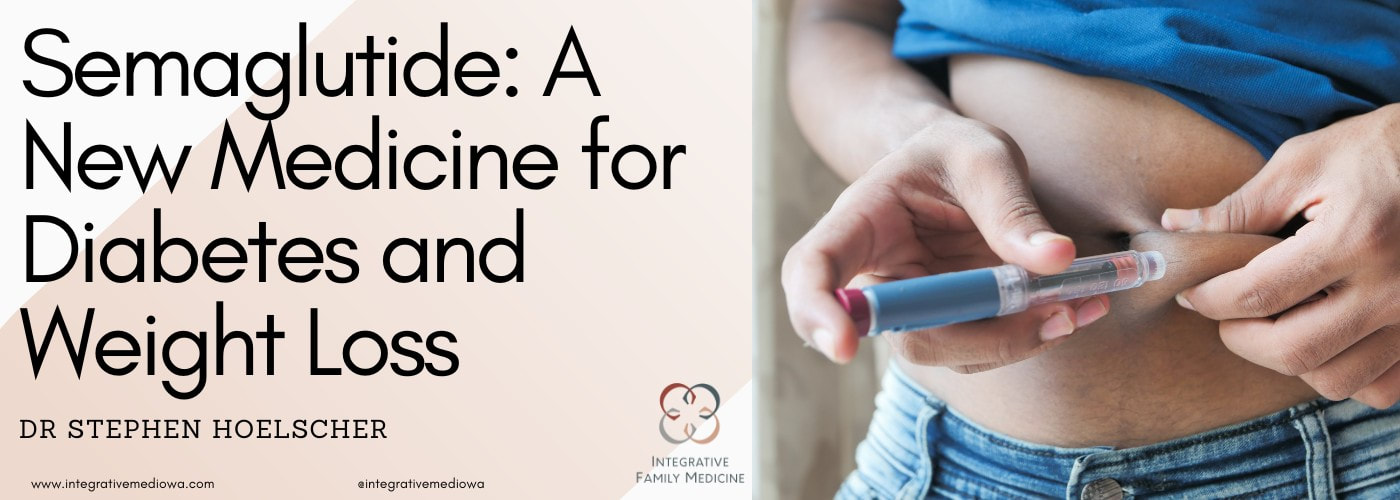|
If you're looking for a new medicine that can help you with diabetes and weight loss, you may want to consider semaglutide. This medicine belongs to a class of drugs called GLP-1 agonists, which are used to stimulate cellular receptors in your body. Semaglutide is a natural hormone that's produced by your body after eating a meal. It increases insulin production and sensitivity of insulin receptors, which helps regulate your blood sugar. It also acts on your stomach and brain to slow down your digestive system and reduce your appetite. Semaglutide is one of several GLP-1 agonists that are used to manage diabetes. However, semaglutide has also been found to be effective for weight loss and reducing the incidence of cardiovascular and cerebrovascular diseases. It comes in three different brands, including Ozempic and Wegovy, which are injectable, and Rybelsus, which is taken by mouth. Injectables tend to be more effective than oral medications because they are not subject to first-pass metabolism, which can reduce the efficacy of the drugs. Semaglutide is particularly effective at promoting weight loss. Clinical studies have shown that people taking this medication have lost at least 10% of their initial body weight. This is because the drug reduces hunger levels, which leads to smaller portions and fewer calories consumed. The drug also improves insulin resistance, which helps regulate blood sugar and reduces the risk of developing cardiovascular and cerebrovascular diseases. The most common side effects of semaglutide are nausea and constipation. These side effects are also common with other GLP-1 agonist drugs. Semaglutide is not recommended for people with a personal history of pancreatitis, MEN-1 syndrome or medullary thyroid carcinoma, or a history of recurrent gallbladder disease. One issue with semaglutide is that it may not be covered by insurance if you're using it for weight loss without a history of diabetes. However, the drug is widely covered for people with diabetes or insulin resistance. Other supporting diagnoses may also qualify for coverage, but this can be complicated. Semaglutide is a powerful tool for achieving ideal health. It not only improves diabetes and weight loss, but it can also lead to improvements in high blood pressure, high cholesterol, sleep apnea, joint disease, fatty liver disease, and depression, as well as other psychological illnesses. This medication can help you improve your diet, energy levels, and health habits, leading to a transformation in your body both externally and internally. In conclusion, semaglutide is a promising new drug that can help you with diabetes and weight loss. If you're interested in learning more about it, talk to your doctor to see if it's right for you. Dr Stephen Hoelscherhttps://www.integrativemediowa.com/stephen.html References.1. Sorli C, Harashima SI, Tsoukas GM, Unger J, Karsbøl JD, Hansen T, et al.. Efficacy and safety of once-weekly semaglutide monotherapy versus placebo in patients with type 2 diabetes (SUSTAIN 1): a double-blind, randomised, placebo-controlled, parallel-group, multinational, multicentre phase 3a trial. Lancet Diabetes Endocrinol (2017) 5:251–60. 10.1016/S2213-8587(17)30013-X [PubMed] [CrossRef] [Google Scholar]
2. Ahrén B, Masmiquel L, Kumar H, Sargin M, Karsbøl JD, Jacobsen SH, et al.. Efficacy and safety of once-weekly semaglutide versus once-daily sitagliptin as an add-on to metformin, thiazolidinediones, or both, in patients with type 2 diabetes (SUSTAIN 2): a 56-week, double-blind, phase 3a, randomised trial. Lancet Diabetes Endocrinol (2017) 5:341–54. 10.1016/S2213-8587(17)30092-X [PubMed] [CrossRef] [Google Scholar] 3. Ahmann AJ, Capehorn M, Charpentier G, Dotta F, Henkel E, Lingvay I, et al.. Efficacy and safety of once-weekly semaglutide versus exenatide ER in subjects with type 2 diabetes (SUSTAIN 3): a 56-week, open-label, randomized clinical trial. Diabetes Care (2018) 41:258–66. 10.2337/dc17-0417 [PubMed] [CrossRef] [Google Scholar] 4. Aroda VR, Bain SC, Cariou B, Piletič M, Rose L, Axelsen M, et al.. Efficacy and safety of once-weekly semaglutide versus once-daily insulin glargine as add-on to metformin (with or without sulfonylureas) in insulin-naive patients with type 2 diabetes (SUSTAIN 4): a randomised, open-label, parallel-group, multicentre, multinational, phase 3a trial. Lancet Diabetes Endocrinol (2017) 5:355–66. 10.1016/S2213-8587(17)30085-2 [PubMed] [CrossRef] [Google Scholar] 5. Rodbard HW, Lingvay I, Reed J, de la Rosa R, Rose L, Sugimoto D, et al.. Semaglutide added to basal insulin in type 2 diabetes (SUSTAIN 5): a randomized, controlled trial. J Clin Endocrinol Metab (2018) 103:2291–301. 10.1210/jc.2018-00070 [PMC free article] [PubMed] [CrossRef] [Google Scholar] 6. Marso SP, Bain SC, Consoli A, Eliaschewitz FG, Jódar E, Leiter LA, et al.. Semaglutide and cardiovascular outcomes in patients with type 2 diabetes. N Engl J Med (2016) 375:1834–44. 10.1056/NEJMoa1607141 [PubMed] [CrossRef] [Google Scholar] 7. Pratley RE, Aroda VR, Lingvay I, Lüdemann J, Andreassen C, Navarria A, et al.. Semaglutide versus dulaglutide once weekly in patients with type 2 diabetes (SUSTAIN 7): a randomised, open-label, phase 3b trial. Lancet Diabetes Endocrinol (2018) 6:275–86. 10.1016/S2213-8587(18)30024-X [PubMed] [CrossRef] [Google Scholar] 8. Lingvay I, Catarig AM, Frias JP, Kumar H, Lausvig NL, le Roux CW, et al.. Efficacy and safety of once-weekly semaglutide versus daily canagliflozin as add-on to metformin in patients with type 2 diabetes (SUSTAIN 8): a double-blind, phase 3b, randomised controlled trial. Lancet Diabetes Endocrinol (2019) 7:834–44. 10.1016/S2213-8587(19)30311-0 [PubMed] [CrossRef] [Google Scholar] 9. Zinman B, Bhosekar V, Busch R, Holst I, Ludvik B, Thielke D, et al.. Semaglutide once weekly as add-on to SGLT-2 inhibitor therapy in type 2 diabetes (SUSTAIN 9): a randomised, placebo-controlled trial. Lancet Diabetes Endocrinol (2019) 7:356–67. 10.1016/S2213-8587(19)30066-X [PubMed] [CrossRef] [Google Scholar] 10. Capehorn MS, Catarig AM, Furberg JK, Janez A, Price HC, Tadayon S, et al.. Efficacy and safety of once-weekly semaglutide 1.0 mg vs once-daily liraglutide 1.2 mg as add-on to 1-3 oral antidiabetic drugs in subjects with type 2 diabetes (SUSTAIN 10). Diabetes Metab (2020) 46:100. 10.1016/j.diabet.2019.101117 [PubMed] [CrossRef] [Google Scholar] 11. Zinman B, Aroda VR, Buse JB, Cariou B, Harris SB, Hoff ST, et al.. Efficacy, safety and tolerability of oral semaglutide versus placebo added to insulin ± metformin in patients with type 2 diabetes: the PIONEER 8 trial. Diabetes Care (2019) 42:2262–71. 10.2337/dc19-0898 [PMC free article] [PubMed] [CrossRef] [Google Scholar]
1 Comment
Vicky Garetson
3/1/2023 09:02:38 am
Interesting article. Could be a game changer for many. I’ve sent this article to my sister who is diabetic.
Reply
Your comment will be posted after it is approved.
Leave a Reply. |
Blog Info
Archives
June 2024
Categories
All
|
|
Visit our Locations
IFM | West Des Moines 475 S. 50th St., Suite 600 West Des Moines, IA, 50265 *Temporarily Closed* IFM | Ankeny 207 NE Delaware Ave. Suite 20 Ankeny, IA 50021 |
Office HoursMonday 9:00 a.m. - 5:00 p.m. Tuesday 9:00 a.m. - 5:00 p.m. Wednesday 9:00 a.m. - 5:00 p.m. Thursday 9:00 a.m. - 5:00 p.m. Friday by appointment. Sat & Sun Closed |
© 2024 Integrative Family Medicine of Iowa, PLLC.
All rights reserved.
All rights reserved.



 RSS Feed
RSS Feed

